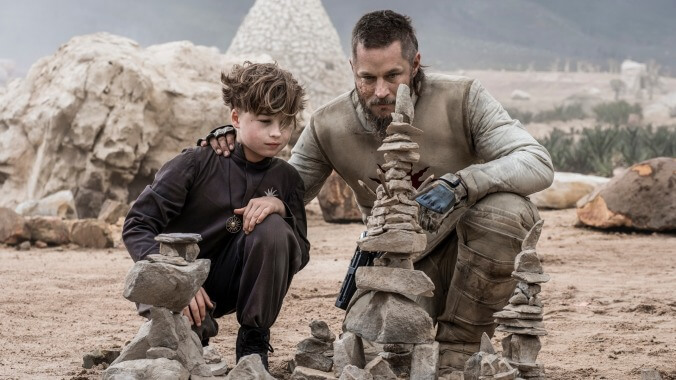What is our core self? Is it something we possess when we are born? Or something that is shaped by time and experience? In “Faces,” Raised By Wolves delves more deeply into these haunting questions, examining what the choices we make say about our character and how much control we actually have over the type of person we become.
Both Mother and Marcus are the central characters in this episode. Without her eyes, Mother can no longer protect herself or her family through violence, but she discovers that her ability to empathize and emotionally connect (the skills she was trained for by her creator) are also real kinds of power. As Marcus continues to hear voices, he becomes more and more confused about who he is and what he believes. He orders that Mother be restrained, tortures her, but refuses to kill her, even though this would obviously be the best option for his family to flee to the tropical zone. Unfortunately for Sue, Marcus is not behaving logically. Instead, he continues to be pushed and pulled between the trauma he experienced as a child soldier and the identity he was supposedly just performing as a Mithraic believer.
One of the reasons that “Faces” works as an episode is that it directly interrogates many of the themes we’ve been exploring all season. Take Father, who has now been re-programmed by the Mithraic to operate as any other android would. Just as it’s hard for the children to believe the caregiver doesn’t even remember them any longer, I found myself hoping that Father’s hand twitches were proof that he was not just any other service model. “There’s a little life left in you,” Marcus tells Father as he opens his mechanical hand, filled with wires and blinking light. It’s unclear if Marcus is simply commenting on Father’s condition or if he actively does something that allows Father’s spirit to remain within him. At the end of the episode, when Father saves Mother with his one shaking hand, it’s unclear how much this action is based in instinct or willful determination and how much our choices are evidence of our inner lives or just the things we’ve been programmed to do.
Going further down this philosophical rabbit hole opens up a lot of questions about Mother, too. Was the reprogramming by her creator about obscuring her real, original intended identity? How much of Mother’s love for her creator is a kind of Stockholm syndrome? Are the stories we tell ourselves based on reality? Mother refuses to answer for what she did to the other children on the Mithraic Ark, perhaps because it doesn’t fit with her understanding of the mission or herself. Is this the same reason that the other children resent Tempest for pointing out the flaws and hypocrisy of the Mithraic faith? Or why the Mithraic cleric refuses to apologize when she is told that the stone temple, built to baptize Campion and make him pure, is made from the gravestones of children who died on Kepler-22b? “It doesn’t matter,” the cleric chortles, smiling, “No need to mark the graves of atheists!”
“Faces” isn’t perfect. A lot of the dialogue is still rather clunky and for all its emphasis on faith, the show’s look at religion isn’t particularly well-developed. Does the fact that the Mithraic people tried baptize Campion indicated that the Mithraic faith is Christian in nature? A religion that evolved from Christianity? Often, Raised By Wolves seems so intent on exploring symbols, that it fails to make its characters truly three-dimensional. It’s one of the reasons that I think the sexual tension between tied-up Mother and Marcus felt more odd rather than interesting. I care about what Mother and Marcus represent, but neither of them feel entirely real to me. Likewise, the ghosts of the children who died just feel kind of generically horrific, not really grounded in emotional attachments that we see characters experience more deeply.
Still, I was impressed by the ways in which our main characters were given the opportunity to grow and change in dynamic and interesting ways this episode. We get more of Marcus’s backstory and see more of how Mother sees the world around her. And we end with an impressively interesting fight that Marcus has with the older parts of himself. He emerges from battle with a wound that may or may not ultimately be self-inflicted, and a conviction that it is he who is the actual orphan boy messiah that the Mithraic have been looking for. Likewise, Mother emerges from near death with a deeper conviction in her life’s mission, telling Father that no matter what happens, she plans to come back for him and the children.
Stray observations:
- Mother was programmed to be a caregiver, but she sure is a terrible therapist!
- Though Tempest’s entire identity is still tied to her trauma, I was glad that we got to see her make some choices this episode.
- I thought it was very touching that Mother advocated for Father and also thanked him.
- Poor Paul is really being led astray by toxic parenting throughout this entire episode. His father is alternately warm and cold to him and his mother is asking him to keep secrets. Paul is a precocious kid who didn’t want to harm a mouse earlier this season and I hope that doesn’t change as he is exposed to more and more conflict and pain. At least he gets his mouse back (praise Sol!) by the end of the episode.









































